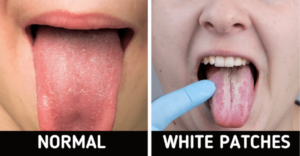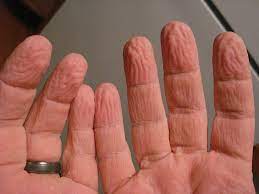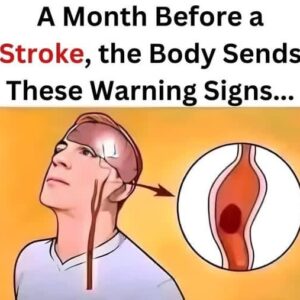Hey there, age is just a number, but it’s important to listen to our bodies as we get older. Sometimes, they send us warning signals that something may not be right. Don’t worry, we’ve got you covered! In this article, we’ll explore some common warning signs that your body may be trying to tell you something important. Remember, it’s always better to be safe than sorry, so let’s dive in!

1) Hair Thinning and Flaking: A Physical Warning
If you notice your hair thinning and experiencing dandruff, it could be a sign of a nutrient deficiency. Your body may be lacking essential vitamins like zinc, iron, or B vitamins (B2, B3, B6, and B7). Don’t panic just yet, incorporating a balanced diet or supplements can help restore your hair’s health.
2) Hands with Wrinkles: A Natural Phenomenon or Something More?

As we age, wrinkles on our hands are natural. However, if you notice an excessive amount of wrinkles, it could be a sign of dehydration, thyroid issues, or poor blood circulation. To keep your hands looking and feeling their best, make sure to stay well-hydrated and consider moisturizing regularly.
3) Bodily Signals: White Spots on the Tongue
Proper oral hygiene is essential, and neglecting it can lead to white spots on your tongue. However, white spots could also be a symptom of oral thrush, which is more common among diabetics. Make sure to maintain good dental care and consult your dentist if you have any concerns.
4) Rashes on the Skin: Not Just a Superficial Issue
Skin rashes can have various causes, such as infections or contact with certain plants. While they may seem harmless, rashes can become a serious health risk if they get infected. It’s important to take proper care of your skin, and if you notice any persistent or worsening rashes, consult a healthcare professional.
5) Swollen Ankles: A Hint About Your Salt Intake and Health
Swollen ankles are often a sign of high salt intake, poor blood flow, or an underactive thyroid. If you notice your ankles swelling, it may be time to reevaluate your diet and lifestyle choices. Remember, moderation is key, and a visit to your doctor can provide further guidance.
6) Dry Eyes and Dry Mouth: Listen to Your Body’s Thirsty Signals
If your eyes are constantly itchy or burning, they may be dehydrated. Dry mouth is another symptom that warrants attention. It could be a result of Sjogren’s syndrome, an autoimmune illness. Stay hydrated, and if you experience persistent dryness, consult a healthcare professional.
7) Signs Your Body Is Bloating: Are You Sensitive to Certain Foods?
Bloating can be uncomfortable, but did you know it could be a sign of food sensitivity? If you often experience bloating or stomach distention after meals, you may have a dietary intolerance or allergy. Keep a food diary to identify potential triggers and consult a doctor or nutritionist for personalized advice.
8) Bruises: More Than Just a Clumsy Mishap
Unexpected bruising might indicate a deficiency in essential vitamins or a problem with blood coagulation. Don’t brush off these bruises as mere accidents. Consider incorporating a well-balanced diet rich in vitamins and consult your doctor if bruising persists.
9) Persistent Hunger: Is It About Dehydration or Something More?
Staying hydrated is crucial, but excessive hunger can be a sign of imbalance. Constant thirst and frequent urination can be indicators of prediabetes. It’s important to strike a balance in your diet and lifestyle, and if you have concerns, consult a healthcare professional.
10) Twitching Muscles: The Body’s Way of Saying “Take It Easy!”
Muscle twitching can happen to anyone, especially after physical exertion. Stress, lack of sleep, renal problems, and neurological disorders can also cause muscle twitches. If muscle twitches become persistent or affect your daily life, it’s time to involve your doctor for further evaluation.
In some cases, persistent snoring may indicate obstructive sleep apnea (OSA). If you or your partner notice excessive snoring, it’s crucial to address it as it may require medical intervention to ensure proper breathing throughout the night.
Remember, this article serves as background reading, and if you ever need medical guidance, don’t hesitate to consult a healthcare professional. It’s important to take good care of your body and pay attention to these warning signs it sends you. How frequently do you make appointments to see your doctor? We’d love to hear your thoughts in the comments!





